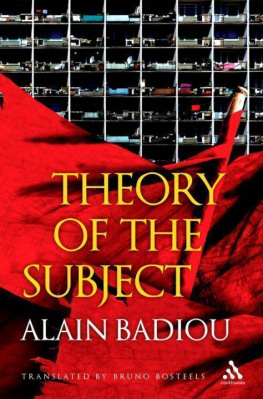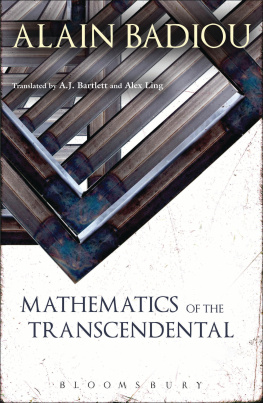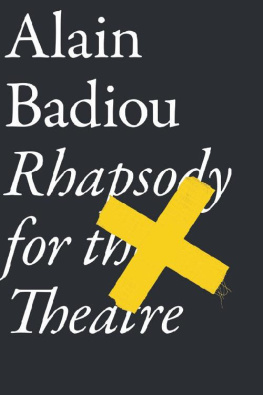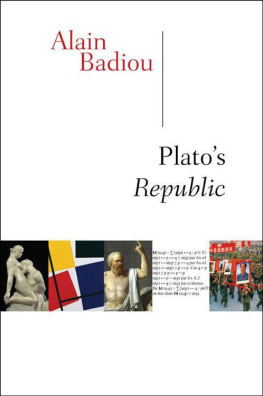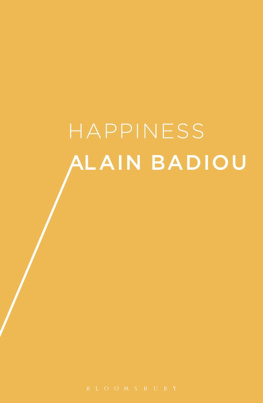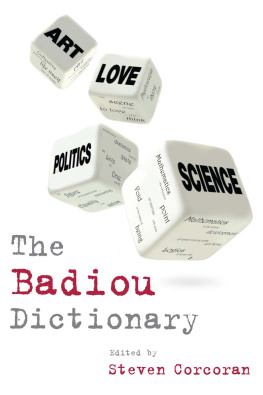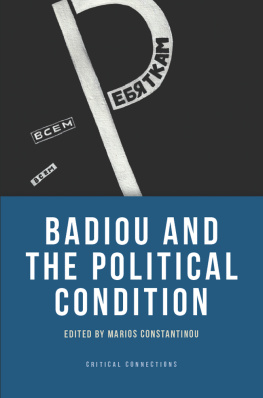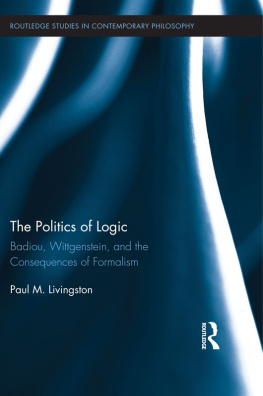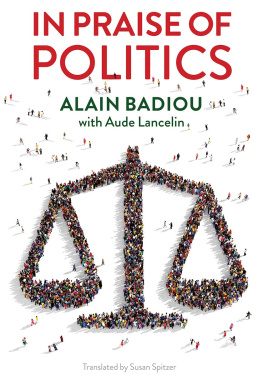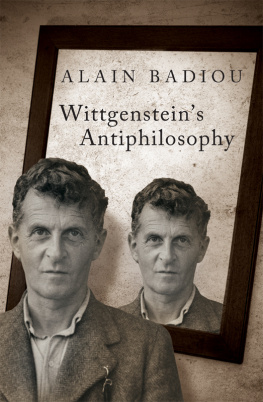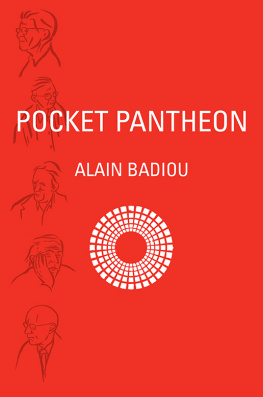Alain Badiou - Theory of the Subject
Here you can read online Alain Badiou - Theory of the Subject full text of the book (entire story) in english for free. Download pdf and epub, get meaning, cover and reviews about this ebook. year: 2013, publisher: Continuum, genre: Religion. Description of the work, (preface) as well as reviews are available. Best literature library LitArk.com created for fans of good reading and offers a wide selection of genres:
Romance novel
Science fiction
Adventure
Detective
Science
History
Home and family
Prose
Art
Politics
Computer
Non-fiction
Religion
Business
Children
Humor
Choose a favorite category and find really read worthwhile books. Enjoy immersion in the world of imagination, feel the emotions of the characters or learn something new for yourself, make an fascinating discovery.
- Book:Theory of the Subject
- Author:
- Publisher:Continuum
- Genre:
- Year:2013
- Rating:5 / 5
- Favourites:Add to favourites
- Your mark:
- 100
- 1
- 2
- 3
- 4
- 5
Theory of the Subject: summary, description and annotation
We offer to read an annotation, description, summary or preface (depends on what the author of the book "Theory of the Subject" wrote himself). If you haven't found the necessary information about the book — write in the comments, we will try to find it.
Theory of the Subject — read online for free the complete book (whole text) full work
Below is the text of the book, divided by pages. System saving the place of the last page read, allows you to conveniently read the book "Theory of the Subject" online for free, without having to search again every time where you left off. Put a bookmark, and you can go to the page where you finished reading at any time.
Font size:
Interval:
Bookmark:

Also available from Continuum:
Being and Event, Alain Badiou
Conditions, Alain Badiou
Infinite Thought, Alain Badiou
Logics of Worlds, Alain Badiou
Theory of the Subject, Alain Badiou
Seeing the Invisible, Michel Serres
After Finitude, Quentin Meillassoux
Dissensus, Jacques Ranciere
The Politics of Aesthetics, Jacques Ranciere
The Five Senses, Michel Serres
Art and Fear, Paul Virilio
Negative Horizon, Paul Virilio
Desert Screen, Paul Virilio
Alain Badiou
Translated, and with an introduction, by Bruno Bosteels

vii
xxxviii
xliii
Theorie du sujet, which hereby at last becomes available in English translation, is Alain Badiou's most passionate and experimental book. In terms of sheer personal engagement, it is perhaps comparable only to his early novels, Almagestes (1964) and Portulans (1967), or to his writings for the theatre such as the opera-novel L'Lcharpe rouge, which dates from the same period (1979), or Ahmed le subtil, a hilarious farce composed in 1984 during a brief period of isolation and calm shortly after the present book was first published in French. In my eyes, Theorie du sujet is also Badiou's most daring, hermetic, and bewildering work of philosophy, and the time that has passed since its original appearance only seems to have added to the effect of bewilderment. Some introductory remarks may therefore be in order so as to situate the book in its wider context.
Presented in the form of a seminar between January 1975 and June 1979, which is to say during the closure of the so-called 'red years' (1966- 76) and in a time that would witness the deplorable rise to fame of the new philosophers' (1976) as well as the false hopes surrounding the creation of the 'common programme' (signed in 1972) uniting Communists, Socialists, and radical Leftists in France; written in the midst of what can only be called an active campaign of ostracism against its author because of his undying Maoism, with some going so far as to call him a 'Maoist pit-bull'; and published in 1982 in the aftermath of the widely celebrated electoral victory in 1981 of Francois Mitterrand to the Presidency, the book makes no concessions to the dominant wisdom and post-political euphoria of its time. To the contrary, solitude only seems to have had an emboldening effect. In this sense, we could apply Badiou's own words, taken from Saint Paul: The Foundation of Universalism, to the author of the present book: 'Everything indicates that he refused any compromise when it came to fidelity to principles.' Or again: 'His discourse is one of pure fidelity to the possibility opened by the event." The pivotal event in this case being not so much the outburst of May '68, whose remarkable intensity and short-lived experience-the two usually going hand in hand within the tradition of ultra-leftism-the book otherwise also seeks to diagnose, so much as the patient action needed to work out the consequences of this uprising, during the first half of the 1970s, in the guise of French Maoism.
The upshot of this principled, not to say stubborn, approach is a work whose legendary difficulty until recently turned away many more readers than it attracted lasting admirers, even from among Badiou's most ardent followers. As Peter Hallward admits: 'Theorie du sujet is by any criteria the most difficult to approach of Badiou's works.'2 Rumour has it that for a long time, in student circles around the University of Paris-VIII at Vincennes, where Badiou taught for thirty years before occupying the post of his former teacher Louis Althusser as head of the Philosophy Department at the tcole Normale Superieure in rue d'Ulm, to point a finger at someone and whisper that he or she was in the process of reading Theorie du sujet was tantamount to declaring this person either insane or fanatical, if not both at once. This rumour goes a long way toward explaining the belated arrival of the book's translation in any language and, even more so, the relative scarcity of sustained critical engagements with its central theses.'
Today, however, there can be no doubt that Theory of the Subject stands as an indispensable building block in the overarching system of Badiou's philosophy, on a par with his two other 'big' books, Being and Event and its recent follow-up, Logics of Worlds. To illustrate this centrality perhaps I may be allowed to invoke my personal experience as someone who, after reading Badiou's Manifesto for Philosophy out of a shared interest in a notion of the 'generic' that would be compatible with Platonism, for political reasons turned to the Maoist pamphlets from the mid-1970s, Theory of Contradiction and Of Ideology, and then decided to tackle Theory of the Subject: I distinctly remember having sat down almost non-stop-this was before the birth of my two sons-for an incredibly long weekend, frantically making my way through the entire book as though it were a novel of intrigue, frequently bursting out in laughter-it is also an extremely funny book-and, in general, sensing as though the whole field of contemporary theory and philosophy opened up freshly before my eyes along the sharpest lines of demarcation to have been traced in the sand since Althusser's ForMarx. All of this happened long before I mustered the courage and dared to take on Being and Event, intimidated as I was-never mind that for Badiou this is a cultural prejudice that is as vacuous as it is stubborn-by the formalization of its extensive mathematical apparatus. Reading Theory of the Subject before Being and Event, though, is not merely a matter of personal preference or anecdotal happenstance. After years of actively following the worldwide reception of Badiou's thought, in fact, I have come to the conclusion that this order of reading, which somewhat conventionally corresponds to the chronological order of the books' publication and thus to their author's trajectory as a philosopher and militant, even though it runs counter to the more common practice among Englishspeaking readers who tend to start with one or other of the books published and translated after Being and Event, makes all the difference in the world in terms of the image of thought that can be attributed to Badiou's philosophy as a whole. Above all, there where a privileged focus on Being and Event frequently leads to the conclusion that this thinker's trajectory involves a clean and irreversible break away from the tradition of the dialectic, Theory of the Subject allows the reader both to nuance, if not exactly refute, this conclusion as far as the idea of the break itself is concerned and to uncover subtle dialectical threads even in the overall metaontological argumentation which, grounded in a solid command of set theory, is supposed to come after this break.
For sure, in hindsight it is not difficult to enumerate the possible limitations and shortcomings of Theory of the Subject. In Being and Event, first of all, Badiou himself indicates that the earlier book remains limited insofar as it presupposes from the start that there is such a thing as subjectivity, without giving this presupposition much ontological support in mathematics. Perhaps this self-criticism is unnecessarily harsh since Theory of the Subject, even though this is often forgotten, already introduces the whole question of Cantorian set theory, all the way to the point of locating the emergence or 'pass' of the subject in the immeasurable excess of inclusion over belonging, or of parts over elements-an excess which will constitute the central 'impasse' in the conceptual arrangement of Being and Event. Even so, it is true that only the later work will systematically elaborate the underpinnings of this thesis from a metaontological, that is to say metamathematical, point of view. As Badiou writes in the Preface: 'The (philosophical) statement that mathematics is ontology-the science of being qua being-is the stroke of light that illuminates the speculative scene which I had restricted, in my Theory of the Subject, by presupposing purely and simply that 'there was some' subjectivization.'4 The new task in Being and Event then consists in articulating, by way of the impasse of being, a coherent ontology together with an interventionist theory of the subject-a task which dialectical materialism in the old days would have accomplished by means of an homology between the dialectics of nature and the dialectics of spirit, and which today requires a careful reformulation of both poles of nature and spirit, or of substance and subject-this time, in Being and Event, above all in an oblique polemic with Heidegger and not only or not primarily with Lacan, as is the case in Theory of the Subject.
Font size:
Interval:
Bookmark:
Similar books «Theory of the Subject»
Look at similar books to Theory of the Subject. We have selected literature similar in name and meaning in the hope of providing readers with more options to find new, interesting, not yet read works.
Discussion, reviews of the book Theory of the Subject and just readers' own opinions. Leave your comments, write what you think about the work, its meaning or the main characters. Specify what exactly you liked and what you didn't like, and why you think so.

